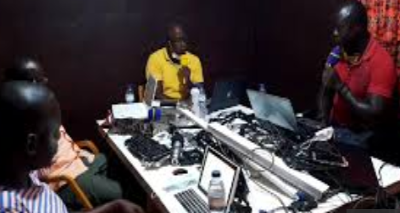[Guinea Bissau\Radio Capital FM]
CPJ: “In the early morning of July 26, unidentified armed men in uniforms of Guinea Bissau’s national guard smashed equipment and other property at the office of the privately-owned Radio Capital FM station in Bissau, the capital.”
Photo: Facebook
Authorities in Guinea Bissau should investigate the vandalism of broadcaster Radio Capital FM and hold those responsible to account, the Committee to Protect Journalists said Monday.
In the early morning of July 26, unidentified armed men in uniforms of Guinea Bissau’s national guard smashed equipment and other property at the office of the privately-owned Radio Capital FM station in Bissau, the capital, according to Lassana Cassamá, the station’s owner and director, who spoke to CPJ over the phone, and photos of the damage, which CPJ reviewed.
Cassamá said Radio Capital FM has not broadcast since the attack because of the damage — including to a transmitter, mixer, computers, and microphones — which will cost an estimated 38,000 euros ($44,663) to fix.
He told CPJ that the station has received threats every few months since 2016, in response to its programming. Cassamá said the station repeatedly reported the threats to the police, but continued receiving them.
“The repeated threats and direct attacks on Radio Capital FM and its staff send a chilling message to the press of Guinea Bissau – all the more so since the recent attackers wore national guard uniforms,” said Angela Quintal, CPJ’s Africa program coordinator. “Authorities must take these threats and attacks seriously, identify the perpetrators, and hold them accountable.”
Radio Capital FM’s broadcasts include a live debate program, which allows people to call in and express their opinions about social issues, politics, and the economy, Cassamá said.
He told CPJ that recent threatening calls have explicitly demanded that the station halt that program. He said the threats also stem from the station’s general commitment to “give a voice to the people.”
The station is an affiliate of the U.S. Congress-funded broadcaster Voice of America, and broadcasts VOA news bulletins daily, according to Cassamá, who also works as a VOA correspondent.
In June, armed men attacked and robbed Serifo Camara, an editor with Radio Capital FM, as he left the station following the 11 p.m. news broadcast, Cassamá told CPJ, adding that he believed it was reprisal for the station’s reporting and the incident was reported to the judicial police.
Bridget Ann Serchak, Voice of America’s director of public relations, told CPJ by email that the outlet had no evidence to suggest Radio Capital FM’s broadcast of VOA content factored in the attack.
VOA’s website reported on July 27 that Mamadu Serifo Djaguite, minister of Guinea Bissau’s presidency and of the council of ministers and a spokesperson for the government, condemned the attack on Radio Capital FM.
Djaguite told the press that the judicial police would conduct an investigation into the July 26 attack, according to Cassamá. CPJ’s messages to Domingos Correia, an inspector with the judicial police, were marked as read but went unanswered. Similar questions to Botché Candé, Guinea Bissau’s minister of interior, went unanswered.
On July 29, the Economic Community of West African States, the African Union, the Community of Portuguese Speaking Countries, the European Union, and the United Nations issued a joint statement of concern over the attacks.







